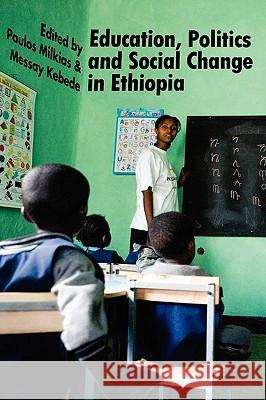Education, Politics and Social Change in Ethiopia » książka
Education, Politics and Social Change in Ethiopia
ISBN-13: 9781599070438 / Angielski / Miękka / 2010 / 232 str.
Deploying the educational context as a background, the contributors-internationally prominent in their fields-wade through the complex maze of Ethiopian history, language, religion, politics, culture and gender. A must read by all those interested and engaged in Ethiopian education in particular and its persistent development challenges as a whole. -Damtew Teferra, Ph. D., Director, International Network for Higher Education in Africa, Center for International Higher Education, Lynch School of Education, Boston College, Chestnut Hill, MA In a multi-disciplinary approach, this seminal work examines, among others, the role of western education, impact of being instructed in English, the invention and imposition of a new WoGaGoDa language in the South, and the national educational strategic plans. With scholarly rigor, eminent Ethiopian scholars offer to enlighten readers on the role of education over the last 100 years. I recommend this book to anyone interested to feed their "intellectual-soul" on education, development, and politics in Ethiopia. -Worku Negash, Ph.D., Vice President, Mission College, Santa Clara, California Contents: 1 Tekeste Negash The Curse of English as a Medium of Instruction in Ethiopian Education System 2 Messay Kebede Comparing Traditional and Modern Education: the Decentering of Ethiopia 3 Paulos Milkias The Challenge of Modernity: Western Education and the Demise of Feudalism In Ethiopia 4 Bekele Haile-Selassie Thomas The Education System of Haile Selassie's Government: the Roots of Political Fiasco 5 Maimire Menasemay Towards A Critical Ethiopian Theory of Education 6 Tibebe Eshete Education, modernity and revival movements: Making Sense of the Pentecostal Expansion in Ethiopia 7 Data Dea Governance, Language Politics and Education in Southern Ethiopia: the Tribulations of Inventing WoGaGoDa 8 Judith Narrowe Development Policy, Education and Training: Women and Change in Contemporary Ethiopia 9 Eva Poluha Prevailing Over the Power of Continuity?
Deploying the educational context as a background, the contributors-internationally prominent in their fields-wade through the complex maze of Ethiopian history, language, religion, politics, culture and gender. A must read by all those interested and engaged in Ethiopian education in particular and its persistent development challenges as a whole.-Damtew Teferra, Ph. D., Director, International Network for Higher Education in Africa, Center for International Higher Education, Lynch School of Education, Boston College, Chestnut Hill, MA In a multi-disciplinary approach, this seminal work examines, among others, the role of western education, impact of being instructed in English, the invention and imposition of a new WoGaGoDa language in the South, and the national educational strategic plans. With scholarly rigor, eminent Ethiopian scholars offer to enlighten readers on the role of education over the last 100 years. I recommend this book to anyone interested to feed their "intellectual-soul" on education, development, and politics in Ethiopia.-Worku Negash, Ph.D., Vice President, Mission College, Santa Clara, CaliforniaContents:1 | Tekeste Negash | The Curse of English as a Medium of Instruction in Ethiopian Education System2 | Messay Kebede | Comparing Traditional and Modern Education: the Decentering of Ethiopia3 | Paulos Milkias | The Challenge of Modernity: Western Education and the Demise of Feudalism In Ethiopia4 | Bekele Haile-Selassie Thomas | The Education System of Haile Selassies Government: the Roots of Political Fiasco5 | Maimire Menasemay | Towards A Critical Ethiopian Theory of Education6 | Tibebe Eshete | Education, modernity and revival movements: Making Sense of the Pentecostal Expansion in Ethiopia7 | Data Dea | Governance, Language Politics and Education in Southern Ethiopia: the Tribulations of Inventing WoGaGoDa8 | Judith Narrowe | Development Policy, Education and Training: Women and Change in Contemporary Ethiopia9 | Eva Poluha | Prevailing Over the Power of Continuity?











